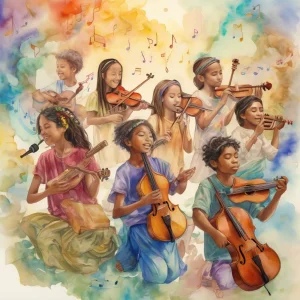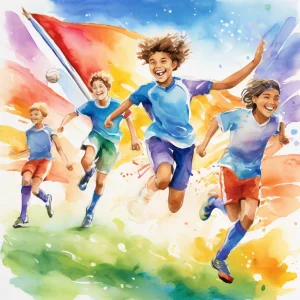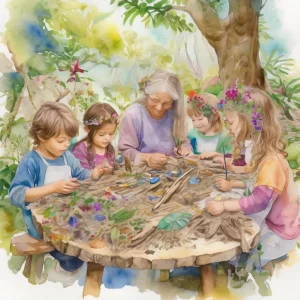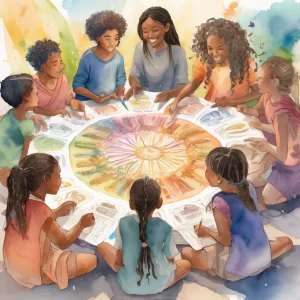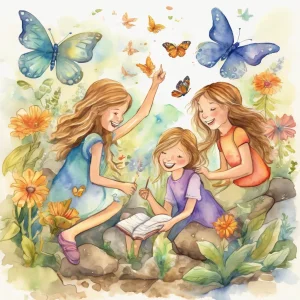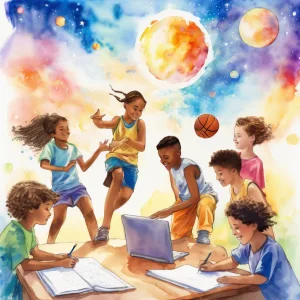Activity
Similar Activities
Cosmic Harmonies: Music from Space Journey
Children’s Age: 10–12 years
Activity Duration: 40 minutes
"Music from Space" is an engaging activity tailored for children aged 10-12, combining fun and education to promote academic growth, empathy, and ecological awareness. Participants…
Activity Duration: 40 minutes
Empathy Tales: The Storybook Creation Adventure
Children’s Age: 2–12 years
Activity Duration: 10 – 15 minutes
This activity helps children aged 2 to 6 develop empathy by creating a personalized storybook. You will need paper, crayons, stickers, scissors, glue, and story prompts like "A Day…
Activity Duration: 10 – 15 minutes
Empathy Through Sports: Team Building Sports Challenge
Children’s Age: 11–15 years
Activity Duration: 1 hour
The "Team Building Sports Challenge" is ideal for kids aged 11 to 15, promoting empathy through sports and teamwork. With sports equipment, paper, and markers, set up stations and …
Activity Duration: 1 hour
Enchanted Garden: Nature Sculpture Garden Adventure
Children’s Age: 4–6 years
Activity Duration: 10 – 25 minutes
Engage children aged 48 to 72 months in the "Nature Sculpture Garden" activity, promoting creativity and empathy. Using natural materials like sticks and leaves, along with clay an…
Activity Duration: 10 – 25 minutes
Whispers of Nature: Eco-Puzzle Challenge
Children’s Age: 8–12 years
Activity Duration: 20 minutes
The "Eco-Puzzle Challenge" activity is a fun and educational way to promote empathy, play skills, and ecological awareness in children aged 8 to 12. Children work in small teams to…
Activity Duration: 20 minutes
Empathy Tales: Cultural Storytelling and Communication
Children’s Age: 11–15 years
Activity Duration: 35 – 40 minutes
Explore the "Cultural Storytelling and Communication" activity for children aged 11 to 15, promoting empathy and language skills through diverse cultural stories. Gather picture bo…
Activity Duration: 35 – 40 minutes
Symmetry Magic: Reflective Art Adventure
Children’s Age: 7–10 years
Activity Duration: 10 – 25 minutes
This activity involves exploring symmetry through a creative and interactive art project for children aged 7-10 years.
Activity Duration: 10 – 25 minutes
Nature Scavenger Hunt: Adventure in the Wild
Children’s Age: 4–9 years
Activity Duration: 10 minutes
An outdoor, nature-based activity promoting ecological awareness and cognitive development in children aged 4-9 years.
Activity Duration: 10 minutes
Eco-Friendly Nature Scavenger Hunt: Discover & Learn
Children’s Age: 11–15 years
Activity Duration: 30 – 40 minutes
Embark on the Eco-Friendly Nature Scavenger Hunt to engage children in nature exploration and ecological learning. This activity promotes communication skills and teamwork while fo…
Activity Duration: 30 – 40 minutes
Melodies of Creation: The Musical Painting Adventure
Children’s Age: 2–3 years
Activity Duration: 15 minutes
Engage children aged 24 to 36 months in the Musical Painting activity, promoting creativity and motor development. Provide paper, paints, musical instruments, and lively music for …
Activity Duration: 15 minutes
Nature Collage - Outdoor Adventure: A Creative Journey
Children’s Age: 2–3 years
Activity Duration: 10 – 15 minutes
Join us for a Nature Collage - Outdoor Adventure designed for children aged 24 to 36 months! This engaging activity promotes cultural development, self-care skills, coordination, b…
Activity Duration: 10 – 15 minutes
Digital Beats and Hoop Dreams Coding Adventure
Children’s Age: 9–12 years
Activity Duration: 10 – 20 minutes
An engaging coding activity integrating music production, basketball skills, and teamwork for children aged 9-12 years.
Activity Duration: 10 – 20 minutes



